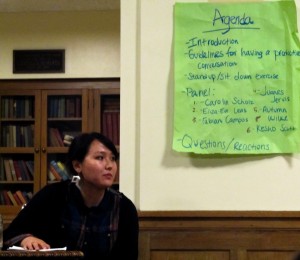By Yanling Xu
xuyanlin@grinnell.edu
Many courses at Grinnell theoretically talk about class and social justice, but this does not always translate into real action. After noticing this paradox, Kamila Berkalieva ’13 came up with the idea to have an open panel discussion on the topic.
The posters for the “Class Matters” event attracted attention from students and faculty. On Tuesday night, in Loose Hall lounge, about 60 participants discussed how class manifests itself at Grinnell.
At the beginning of the conversation, one of the organizers, Hannah Kapp-Klote ’13, described the reason for the panel.
“Class is a very big part of

Grinnell,” she said. “We thought it would be cool to talk about like this. And it also brings some strategies to make class conversation productive on campus more often.”
The five panel members were Carolin Scholz ’13, Fabian Campos ’15, Juanes Jervis ’14, Eliza-Eve Leas ’13, Co-Editor-in-Chief of the S&B, and RLC Autumn Wilke. Kesho Scott, Sociology, also participated.
To begin, panel members talked about their experiences and their own perspectives on class.
“I didn’t have a cellphone when I first got here,” Campos said. “So when people came up and asked, ‘What’s your phone number?’ I came up with an excuse and tried to pretend that I was on the same status. So the way I see it is that there is an expectation that everybody here is from the same background, and has the same opportunities. In reality, we don’t.”
“There is a pre-Grinnell and a Grinnell,” Jervis said. “Pre-Grinnell means looking at my class status and class position before I came here. I’m an international student. How you define class in my country is really different from how you define class here.”
The rest of the panel members shared personal backgrounds and experiences that in many ways shaped their perspectives on class, ranging from experiences in upper-class schools to working class communities to special identities as international students.
Further into the second part of conversation, students raised their voices about class at Grinnell. SGA Vice President for Student Affairs Sivan Philo ’13 pointed out that class not only affects the way people act but also their social life.
“I think one thing that nobody really wants to talk about is how class affects who you hang out with, where you live on campus, who you spend time with, who your close friends are here and how class affects your social life pre and at Grinnell,” Philo said.
Berkalieva agreed.
“At Grinnell, [your class] really influences how your whole experience is here,” she said.
She pointed out that spending more time working at a job results in less time for academics, extracurricular activities, mental wellness and social life.
The panel ended with a summary of what students learned and things they could do to take this conversation out of the room. An increasing number of these panel discussions will be held in the future.
“We are hoping to have a Facebook dialogue later on this semester,” Berkalieva said. “We had about one hour and 45 minutes yesterday, but I thought it wasn’t enough. We hope to continue it because it will be sad to just stop.”

















































